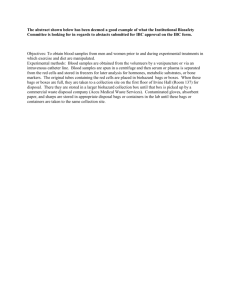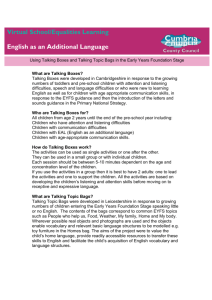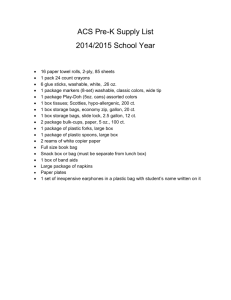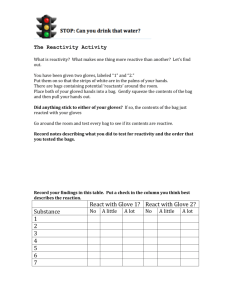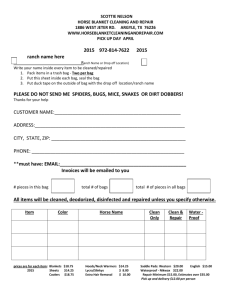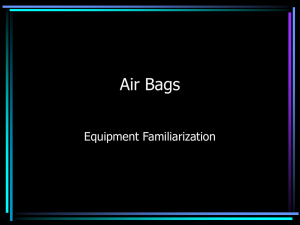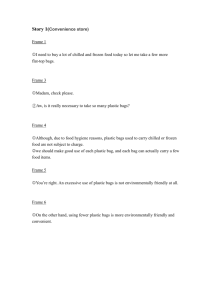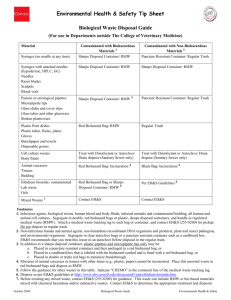HS009 Waste Disposal - Community Care Trust
advertisement
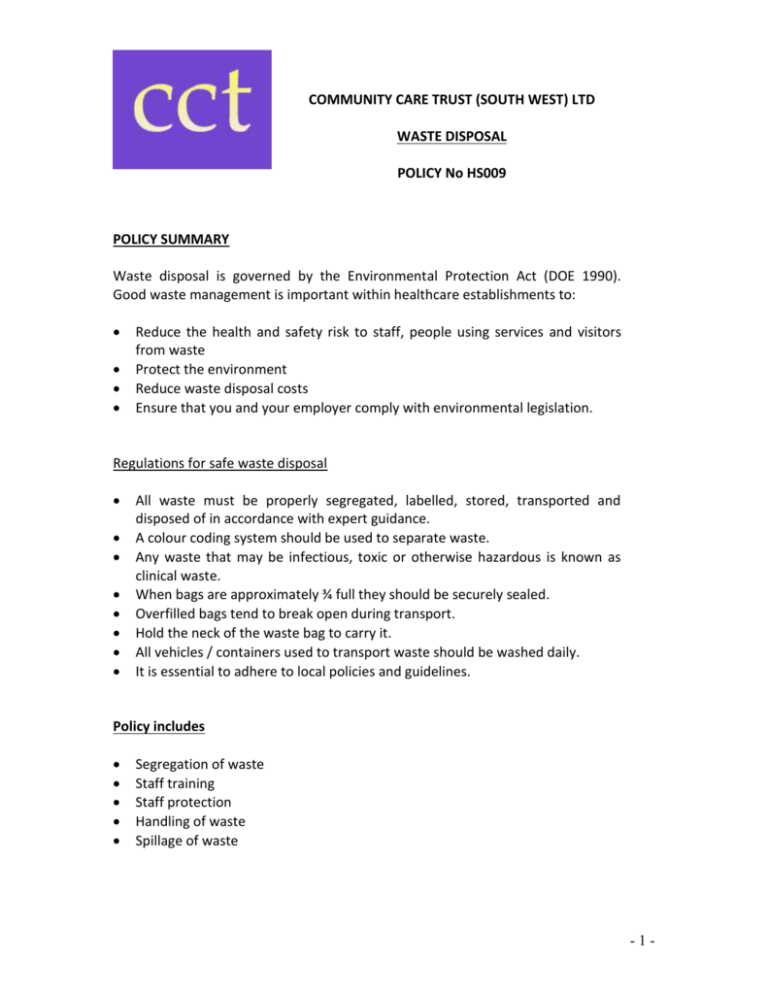
COMMUNITY CARE TRUST (SOUTH WEST) LTD WASTE DISPOSAL POLICY No HS009 POLICY SUMMARY Waste disposal is governed by the Environmental Protection Act (DOE 1990). Good waste management is important within healthcare establishments to: Reduce the health and safety risk to staff, people using services and visitors from waste Protect the environment Reduce waste disposal costs Ensure that you and your employer comply with environmental legislation. Regulations for safe waste disposal All waste must be properly segregated, labelled, stored, transported and disposed of in accordance with expert guidance. A colour coding system should be used to separate waste. Any waste that may be infectious, toxic or otherwise hazardous is known as clinical waste. When bags are approximately ¾ full they should be securely sealed. Overfilled bags tend to break open during transport. Hold the neck of the waste bag to carry it. All vehicles / containers used to transport waste should be washed daily. It is essential to adhere to local policies and guidelines. Policy includes Segregation of waste Staff training Staff protection Handling of waste Spillage of waste -1- Refer to table below: Type of Waste Disposal Domestic waste Black Plastic bags. Do not overfill bags. including household rubbish, flowers, paper hand towels, tissues, clean paper, plastic waste, etc Tie at neck. Kitchen waste including food Destroy on day of preparation using waste disposal for compost able products Confidential paper waste. Confidential paper waste – shredded Label bag with source. Remove for landfill collection. Remove for recycling All clinical waste including used dressings, gloves, sanitary items, catheter and stoma bags, nappies, Fouled / infected inco pads Yellow plastic clinical waste bags for incineration. Seal bags when no more than ¾ full. Ensure secure sealing. Heavy gauge or double bagging is required for infected waste with each bag individually sealed. Each bag must be labelled to identify its source All sharps Including: syringes and needles glass ampoules, stitch cutters, scalpel blades, disposable razors, small contaminated glass items, broken or requiring disposal. Sharps boxes for incineration – only boxes complying with the current British Standard must be used. Seal boxes when no more than 2/3 full. Lock boxes before removal from the point of use. Do not tape lid to seal boxes. Glass bottles, broken domestic glass and crockery, used aerosol cans and batteries Strong designated cardboard boxes Pharmaceutical waste Special waste regulations (1996) and Misuse of Drugs regulations may apply. Do not discharge to sewers. Local collection arrangements (e.g. via pharmacy) e.g. prescription only medicines, drugs or other pharmaceutical products Aerosol cans and batteries will explode if sent for incineration -2- Staff training It is the Responsible Manager’s responsibility to ensure that all staff understand and comply with the CCT’s Waste Disposal Policy All staff who are required to handle waste should have training Staff protection Staff should: wear protective clothing and dispose of it correctly have Hepatitis B and tetanus vaccination Handling of waste ensure that the different types of waste are placed in the appropriate containers always use a foot pedal to open clinical waste bins never put a yellow bag inside a black bag and vice versa never put your hands inside any waste bag or container no waste bags should be compressed by staff all waste bags should be handled with care, by the neck – never clasped against the body and never thrown or dropped ensure that clinical waste bags are not split or punctured in any way – if they are, rebag in the corresponding coloured bag and re-label any bag containing large amounts of fluids should be double bagged to reduce the risk of spillage and leaks Spillage of waste All spillage must be regarded as potentially hazardous and dealt with immediately Under no circumstances should members of the public be allowed to assist or be involved in any way in the cleaning up of the spillage Date of last review: Version number: Date of next review: October 2014 02 October 2017 Signature ………………………………… -3-
